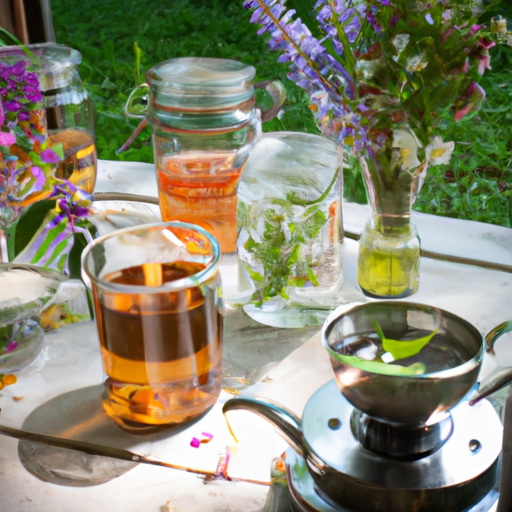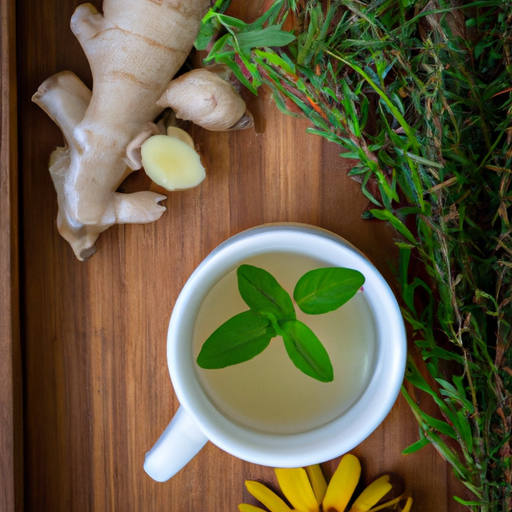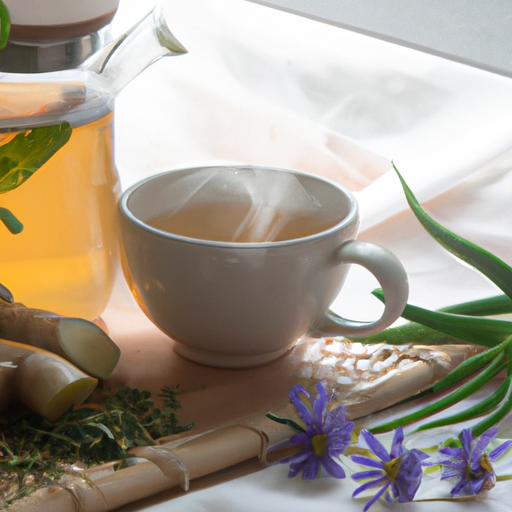Approximately 1 in 8 couples struggle with infertility. If you and your partner are trying to conceive, you may be wondering what steps you can take to increase your chances of success.
One area that often gets overlooked is the impact of herbal teas on fertility. While there is limited scientific research on this topic, some herbal teas have been traditionally used to support reproductive health.
In this article, we will explore seven herbal teas that are deemed safe for those trying to conceive. Raspberry Leaf Tea, for example, has long been used to tone the uterus and prepare it for pregnancy. Nettle Leaf Tea is rich in vitamins and minerals that can support overall reproductive health. Red Clover Tea is believed to help balance hormones, while Peppermint Tea can aid in digestion and reduce stress. Chamomile Tea is known for its calming properties, while Ginger Tea can promote circulation and balance hormones. Lastly, Lemon Balm Tea can help reduce anxiety and promote relaxation.
While these teas are generally considered safe, it is always best to consult with your healthcare provider before adding them to your daily routine.
Key Takeaways
- Raspberry Leaf Tea is beneficial for preparing the uterus for pregnancy and providing essential vitamins and minerals for reproductive health.
- Nettle Leaf Tea supports reproductive health, balances hormones, and detoxifies the body.
- Red Clover Tea helps balance hormones, improve cervical mucus production, and supports overall reproductive function.
- Peppermint Tea aids in digestion, reduces stress, and can be incorporated into daily routine for fertility support.
Raspberry Leaf Tea
If you’re trying to conceive, raspberry leaf tea can be a delightful and safe choice for you to enjoy while on your journey. This herbal tea has been used for centuries and is known for its numerous benefits. Raspberry leaf tea is rich in vitamins and minerals such as vitamin C, vitamin E, iron, and calcium, which are essential for reproductive health.
It is also believed to strengthen the uterine muscles and prepare the body for pregnancy. As for the dosage, it’s recommended to start with one cup a day and gradually increase it to three cups a day. However, it’s always best to consult with your healthcare provider to ensure the right dosage for your specific needs.
So sit back, relax, and sip on some raspberry leaf tea as you embark on your journey to conception.
Nettle Leaf Tea
When you want to boost your chances of starting a family, sipping on the nourishing elixir of nettle leaf can be like a warm hug for your fertility journey.
Nettle leaf tea is a herbal remedy that’s been used for centuries to support reproductive health and increase fertility. Here are some benefits of nettle leaf tea for fertility:
-
Nourishes the reproductive system: Nettle leaf is rich in vitamins and minerals that’re essential for reproductive health, such as iron, calcium, and vitamin K.
-
Balances hormones: Nettle leaf tea helps to balance hormones in the body, which’s crucial for regulating the menstrual cycle and optimizing fertility.
-
Detoxifies the body: Nettle leaf has diuretic properties that help to flush out toxins from the body, promoting a healthy environment for conception.
-
Boosts circulation: Improved blood flow to the reproductive organs can increase the chances of successful conception.
To incorporate nettle leaf tea into your daily routine while trying to conceive, simply steep a teaspoon of dried nettle leaf in hot water for 5-10 minutes. Drink 1-2 cups daily for optimal benefits.
Remember to consult with your healthcare provider before adding any herbal tea to your routine.
Red Clover Tea
Red clover tea, known for its abundance of isoflavones, can be a nourishing addition to your fertility journey. This herbal tea has been used for centuries to support reproductive health and boost fertility. Red clover tea benefits include its ability to balance hormones, improve cervical mucus production, and support overall reproductive function. It contains phytoestrogens, which are plant compounds that mimic the effects of estrogen in the body. These compounds can help regulate the menstrual cycle and promote ovulation. Additionally, red clover tea is rich in vitamins and minerals that are essential for reproductive health, such as calcium, magnesium, and vitamin C. Incorporating red clover tea into your daily routine can be a simple and natural way to enhance your fertility.
| Red Clover Tea Benefits | Red Clover Tea Fertility |
|---|---|
| Balances hormones | Improves cervical mucus |
| Regulates menstrual cycle | Promotes ovulation |
| Rich in vitamins and minerals | Supports overall reproductive function |
Peppermint Tea
Peppermint tea is a refreshing and invigorating beverage that can bring a burst of coolness and rejuvenation to your daily routine. Not only does it taste delicious, but it also offers several benefits that may support your fertility journey.
-
Peppermint tea benefits:
- Relieves digestive issues: Peppermint has been used for centuries to alleviate bloating, cramps, and indigestion, which can be common obstacles when trying to conceive.
- Reduces stress and anxiety: High stress levels can negatively impact fertility. Peppermint tea has calming properties that can help promote relaxation and reduce stress.
-
Peppermint tea and fertility:
- Balances hormones: Peppermint tea may help regulate hormone levels, which is essential for optimal fertility.
- Improves blood flow: Proper blood circulation is crucial for reproductive health, and peppermint tea can aid in improving blood flow to the reproductive organs.
Incorporating peppermint tea into your daily routine can be a simple and enjoyable way to support your fertility journey. However, it’s always recommended to consult with a healthcare professional before making any significant changes to your diet or lifestyle.
Chamomile Tea
If you’re looking for a soothing and calming beverage to incorporate into your daily routine, chamomile tea is a gentle option that can bring relaxation and tranquility to your day.
Chamomile tea has been used for centuries for its numerous health benefits, including its potential effects on fertility. While there’s limited scientific research specifically on chamomile tea and fertility, it’s believed to have positive effects on reproductive health.
Chamomile tea is rich in antioxidants and anti-inflammatory properties, which may help reduce inflammation in the reproductive system and promote overall reproductive health. Additionally, chamomile tea is known for its calming properties, which can help reduce stress and anxiety, both of which can have a negative impact on fertility.
However, it’s important to note that individual results may vary, and it’s always recommended to consult with a healthcare professional before making any significant changes to your diet or lifestyle when trying to conceive.
Ginger Tea
Ginger tea is a warm and comforting remedy that can invigorate your senses and bring a zing of flavor to your day. When it comes to trying to conceive, ginger tea can offer several benefits. It’s known to improve blood circulation, which is essential for reproductive health. Ginger contains antioxidants that can help reduce inflammation and support a healthy reproductive system. Additionally, it can aid in digestion and relieve nausea, which can be beneficial during pregnancy.
To prepare ginger tea for conception, start by peeling and slicing a fresh ginger root. Boil a cup of water and add the ginger slices. Let it steep for about 10 minutes, then strain and enjoy. You can also add a squeeze of lemon or a teaspoon of honey for added taste. Remember to consult with your healthcare provider before making any significant dietary changes.
Lemon Balm Tea
Allow lemon balm tea to infuse your senses with its soothing aroma and delicate flavor, transporting you to a tranquil state of relaxation and rejuvenation.
This herbal tea not only offers a delightful sensory experience but also comes with several benefits for those trying to conceive. Lemon balm tea is known for its ability to promote hormonal balance, which is crucial for fertility. By regulating hormone levels, lemon balm tea can help create an optimal environment for conception.
Additionally, this tea has been found to reduce stress and anxiety, which can have a negative impact on fertility. A calm and relaxed state of mind is essential when trying to conceive. So, sipping on a cup of lemon balm tea can be a refreshing way to support your fertility journey.
Frequently Asked Questions
Are there any specific herbal teas that should be avoided when trying to conceive?
When trying to conceive, it’s important to be cautious about the herbal teas you consume. Some herbal teas can affect hormone levels and pose potential risks to fertility.
Can herbal teas help regulate menstrual cycles and enhance fertility?
Incorporating herbal teas into your fertility diet can offer several benefits for overall reproductive health. They can help regulate menstrual cycles and enhance fertility. Let’s explore how to incorporate these teas into your daily routine.
What is the recommended dosage of herbal teas for women trying to conceive?
The recommended dosage of herbal teas for women trying to conceive varies depending on the specific herb. Herbal teas can provide numerous benefits for fertility, such as regulating menstrual cycles and promoting hormonal balance.
Is it safe to consume herbal teas during pregnancy if I have been using them while trying to conceive?
Yes, it is generally safe to continue consuming herbal teas during pregnancy if you have been using them while trying to conceive. However, it is important to consult with your healthcare provider to ensure their safety and discuss any potential risks. Herbal teas can provide benefits for overall reproductive health, but it is crucial to be aware of safety precautions and considerations during pregnancy to avoid any potential harm.
Can herbal teas interfere with fertility medications or treatments?
Herbal teas can potentially interfere with fertility medications and treatments. It is important to consult with a healthcare professional before using herbal teas during fertility treatments to avoid any potential risks or interactions.
Conclusion
In conclusion, when it comes to herbal teas that are safe for trying to conceive, there are various options to choose from. Raspberry leaf tea, nettle leaf tea, red clover tea, peppermint tea, chamomile tea, ginger tea, and lemon balm tea all offer potential benefits for fertility.
However, it’s important to consult with a healthcare professional before incorporating any new herbal teas into your routine. Just like a well-tended garden full of diverse flowers, finding the right herbal tea can nurture and support your journey towards conception.










